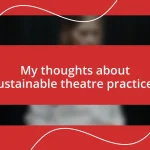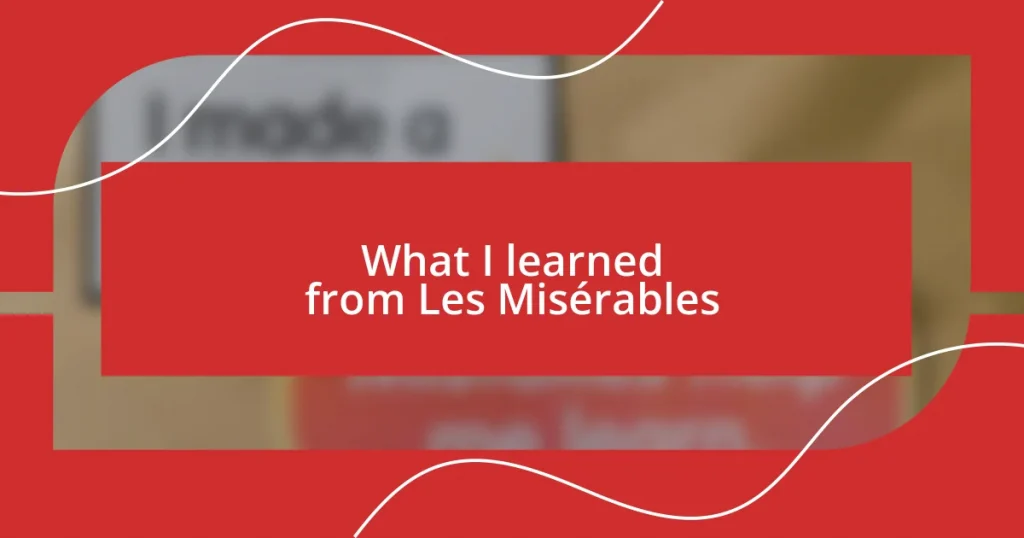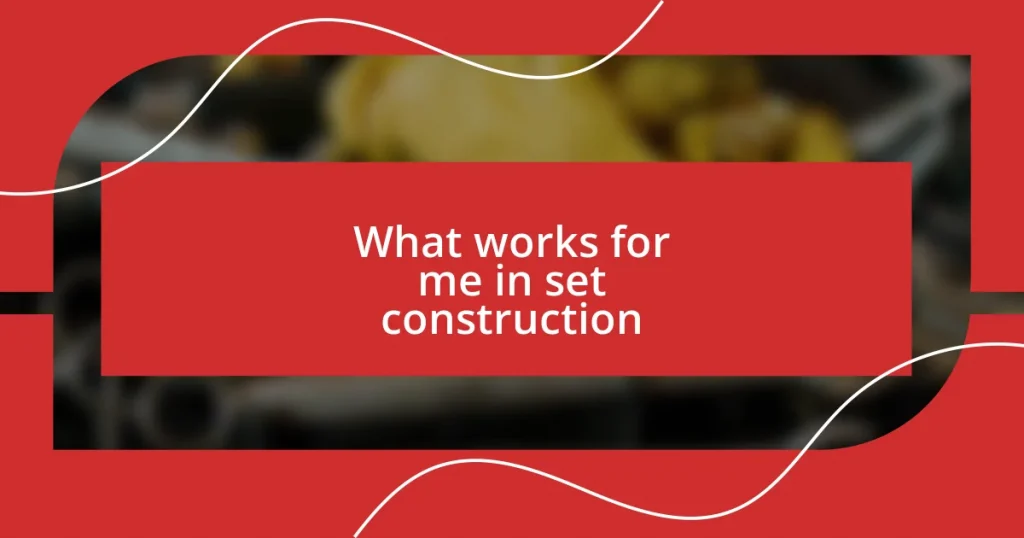Key takeaways:
- Redemption and personal growth can stem from adversity, as seen through Jean Valjean’s transformation and the importance of self-forgiveness.
- Compassion and sacrifice are essential to human connection, illustrated by the relationships between characters and their acts of selflessness.
- The theme of social injustice highlights the ongoing responsibility to advocate for the vulnerable and challenge systemic inequalities in society.

Key Themes in Les Misérables
One of the central themes in Les Misérables is the struggle for redemption. I remember reading about Jean Valjean’s transformation from a hardened ex-convict to a compassionate benefactor. It made me reflect on my own life when I had to confront past mistakes. Can people truly change, or are we forever linked to our past? Valjean’s journey suggests that the capacity for change is inherent in us all, which I find incredibly hopeful.
Another key theme is the nature of love and sacrifice. When Fantine sacrifices everything for her daughter, it struck a deep chord with me. I recall a time when I had to support a friend through a difficult situation, putting their needs before my own. It made me realize how love often demands personal sacrifice, and that resonated throughout the novel as characters face their own trials for the ones they cherish.
Finally, the theme of social injustice permeates the story. The stark portrayal of poverty left me feeling a mix of anger and empathy. As I read about the struggles of the less fortunate characters, I couldn’t help but draw parallels to modern society. Shouldn’t we all feel a responsibility to advocate for change? The vivid depiction of inequality serves as a powerful reminder that the fight for justice is ongoing, urging us to reflect on our own role in addressing these issues.

Lessons on Redemption and Forgiveness
One of the most poignant lessons on redemption in Les Misérables is that forgiveness often requires a monumental inner strength. When Valjean forgives Javert at a moment of intense conflict, I felt my heart race. It reminded me of a time when I had to let go of resentment towards someone who had wronged me. Choosing to forgive wasn’t easy, but like Valjean, I discovered peace in relinquishing the burden of anger, allowing me to move forward in my life.
The story also illustrates that forgiveness doesn’t always mean absolution. Javert’s rigid adherence to law leads to his tragic end, highlighting the consequences of not forgiving oneself. I once encountered a situation where a friend couldn’t forgive himself for a mistake. It taught me that, as much as we desire to forgive others, we often forget that the hardest person to forgive is ourselves. Valjean’s journey, filled with self-reflection, showcases how integral self-forgiveness is to healing and growth.
Lastly, redemption is not only about individual journeys; it’s also about the impact of our actions on others. Valjean’s kindness toward the orphaned Cosette embodies how acts of compassion ripple through lives, creating hope. I recall volunteering at a local shelter where I witnessed small acts of kindness transform lives. Every time someone showed love and care, it was like a light cutting through despair. Valjean’s ability to inspire change around him served as a powerful reminder for me that we all have the capacity to uplift others along our paths to forgiveness and redemption.
| Key Aspect | Example from Les Misérables |
|---|---|
| Forgiveness Requires Strength | Valjean forgiving Javert |
| Self-Forgiveness is Essential | Javert’s tragic end due to inability to forgive himself |
| Impact on Others | Valjean’s kindness to Cosette |

Impact of Social Injustice
The impact of social injustice in Les Misérables profoundly resonated with me. The harsh realities faced by characters like Fantine and the poor Parisians left an indelible mark on my consciousness. I remember a time in my community when a local family lost their home. I felt that same anger and empathy as I saw the world through their eyes, echoing the suffering depicted in the novel. It’s an uncomfortable truth that many endure systemic inequalities, often leading to dire consequences, revealing just how deeply social conditions affect the human experience.
Here’s a breakdown of the social injustices highlighted in the story:
- Poverty’s Stranglehold: Characters like Fantine are driven to desperation, showcasing the corrupting power of socio-economic disparities.
- Legal Rigidity: Javert epitomizes the inflexibility of a law that fails to consider individual circumstances, leading to tragic outcomes.
- Marginalization: The story brings forth the plight of individuals who are sidelined in society, emphasizing a collective responsibility toward vulnerable groups.
Reflecting on these themes, I can’t help but think about my own responsibility to lift up those in need. It’s a commitment that I strive to incorporate into my life, much like Valjean’s relentless quest for justice in a world filled with inequality.

Importance of Compassion and Sacrifice
Compassion and sacrifice are cornerstones of human connection, as demonstrated through Valjean’s actions throughout Les Misérables. When Valjean chooses to protect Cosette from her harsh reality, it struck a chord with me. I remember a time when I stepped up to help a friend navigate a tough period in their life, sacrificing my own time and energy. That experience taught me that, like Valjean, true compassion often asks us to put others before ourselves, creating bonds that enrich our lives profoundly.
The sacrifices made by characters like Fantine remind us that love frequently comes with personal cost. I often reflect on moments in my life when I’ve felt torn between pursuing my own goals and stepping back to support loved ones. Those moments of sacrifice are bittersweet, yet they hold an extraordinary depth of meaning. In choosing compassion over self-interest, we resonate with the essence of humanity; it might leave us exhausted, but it also fills our hearts with a sense of purpose and connection.
Moreover, the interplay between compassion and sacrifice highlights our shared humanity. When I witnessed a community rallying together to support those affected by a natural disaster, it felt like the embodiment of Valjean’s legacy. How often do we extend a helping hand, expecting nothing in return? Every small act of kindness can create a ripple effect, inspiring others to do the same. Just as Valjean’s sacrifices changed the course of lives around him, our individual choices to act with compassion can spark change in the world. Each encounter becomes an opportunity—not just to give, but to forge deeper, more meaningful connections.

Personal Growth through Adversity
Personal growth through adversity is a powerful theme woven throughout Les Misérables. I still remember a particularly challenging period in my life when I faced significant setbacks. In that moment, I discovered resilience within myself that I never knew existed. Just like Jean Valjean, whose transformations stemmed from suffering, I found that my struggles forced me to reassess my priorities and values, enabling personal growth I now cherish.
Adversity often provides the clearest lens through which we see our true selves. I stumbled through a tough job loss a few years ago, feeling lost and vulnerable. Much like Fantine, who faced hardship with unwavering strength, I realized that my worth wasn’t solely tied to my job title. That experience taught me to embrace vulnerability and allowed me to identify my passions more clearly. Have you ever faced a challenge that revealed your true capabilities? When you push through hardship, you often emerge stronger and more self-aware.
In exploring these narratives, I feel a profound connection to the idea that adversity shapes us. It’s like crafting a diamond from a lump of coal; the pressure teaches us to shine our brightest. I often reflect on how my community rallied during tough times, reminding me of the friendships built through struggle. Each time we support each other in hardship, we forge bonds that transform our lives. Can we harness our own adversities to connect more meaningfully with those around us? By reflecting on our struggles and sharing our stories, we not only grow as individuals but also enrich the lives of those we encounter.

Understanding the Role of Love
Understanding the Role of Love
Love in Les Misérables is profound and multifaceted, shaping characters and their actions in ways that can resonate deeply with our own lives. I recall once being in a relationship where the foundations were built on mutual support and understanding. Just like Valjean’s enduring love for Cosette, this experience taught me that love often transcends personal sacrifices—it’s about lifting each other up so that we can pursue our dreams together. Have you ever felt that kind of transformative love?
Through the characters’ intertwined journeys, we see that love can be a source of strength and vulnerability alike. For instance, Fantine’s unconditional love for her daughter propelled her into unimaginable hardships. In moments of struggle, I found myself asking, “What would I endure for the ones I love?” This thought not only humbled me but also ignited a fierce resolve to protect and nurture those dear to me, reminding me that love often asks us to carry burdens that may weigh heavily on our hearts.
Moreover, love isn’t always about grand gestures, but often the quiet, steadfast support we offer to one another. I remember a friend who took time out of their busy life to simply be there when I faced a personal crisis. Much like Valjean’s constant presence in Cosette’s life, those small but meaningful gestures are what truly signify love. How do you show love in your everyday life? I’ve found that offering a listening ear or a comforting hug can create lasting connections, emphasizing love’s power to heal and transform even the simplest of moments.

Applying Lessons to Everyday Life
Applying the lessons from Les Misérables to our everyday lives can be transformative, particularly when it comes to understanding compassion. A few years back, I volunteered at a local shelter, where I encountered people whose stories deeply resonated with me. Seeing them open up about their struggles made me realize that empathy can bridge vast divides; it’s crucial to offering genuine support. Have you ever felt that connection with someone coming from a different background? I learned then that a simple act of kindness can make a world of difference.
Another important lesson revolves around the idea of redemption. I remember a time when I misjudged someone based solely on their past mistakes. Reflecting on Valjean’s journey and his quest for forgiveness, I began to reassess my own biases. This prompted me to have open conversations with that person, leading to unexpected friendships. Can we offer others the grace of a second chance? I believe that recognizing potential for change in others is a vital part of fostering community and understanding.
Moreover, I’ve found that standing up against injustice in small ways can lead to significant change. Not long ago, I witnessed a friend being unfairly treated in a workplace situation. Inspired by the courage of characters like Éponine, who took bold stands for what they believed in, I decided to speak up on their behalf. This not only empowered my friend but also encouraged others around us to challenge unacceptable behavior. How often do we let silent discontent slide? It’s a reminder that every voice matters, and standing up for what is right can inspire others to do the same.















